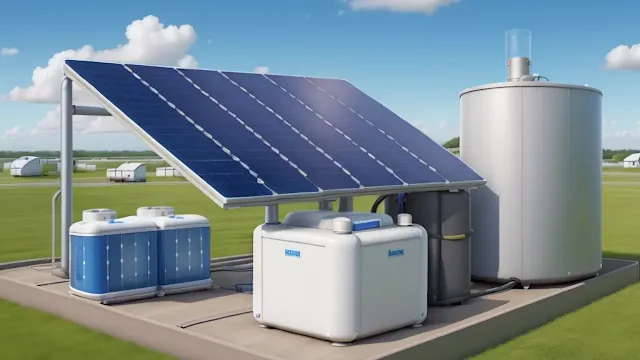 |
| rooftop hydrogen generators |
In the quest for sustainable energy solutions, the decentralization of electrical power generation through rooftop solar units has emerged as a promising avenue. This approach not only addresses power losses along transmission lines but also plays a crucial role in curbing greenhouse gas emissions. However, the intermittent nature of solar energy necessitates effective energy storage solutions. While traditional batteries have been the go-to choice, they come with their own set of limitations – limited lifespan, low storage capacity, uncontrolled discharge, and a finite number of charge/discharge cycles.
However rooftop hydrogen generators, a cutting-edge solution poised to redefine energy storage in residential solar power systems. Unlike conventional batteries, these generators utilize electrolysis to produce hydrogen from water, offering a compelling alternative with unique advantages.
Rooftop Hydrogen Generators: Harnessing the Power of Electrolysis
At the heart of this innovation lies a device installed on the rooftop, equipped with a water-filled chamber. This ingenious system employs electrolysis to transform water into hydrogen, a versatile fuel that can be utilized for various purposes, from powering vehicles to cooking. Unlike traditional hydrogen cylinders, rooftop generators store only minimal quantities of the gas, minimizing the potential environmental impact in case of a leak.
How Do Rooftop Hydrogen Generators Work?
Picture this: a rooftop device transforming water into a clean and efficient energy source. The process involves using electricity from the rooftop solar plant to perform electrolysis, splitting hydrogen atoms from oxygen. This is accomplished within a specialized cell inside the hydrogen generator. While the current approach involves using electricity, ongoing research explores the possibility of direct water splitting using sunlight, utilizing photoelectrochemical cells without the need for electricity.
Overcoming Challenges: The Cost Factor
Despite the promising potential of rooftop hydrogen generators, the current hurdle lies in their cost. Electrolysers, the key components driving this technology, come with a hefty price tag, contributing to an estimated rooftop hydrogen cost of approximately $7.50 per kilogram. Industry experts, however, remain optimistic, anticipating a decline in prices as manufacturing processes become more widespread.
In conclusion, rooftop hydrogen generators represent a groundbreaking leap in the pursuit of efficient and sustainable energy storage for residential solar power systems. As advancements continue and manufacturing scales up, the cost factor is likely to diminish, making this technology an increasingly viable and eco-friendly choice for decentralized power generation. The journey towards a greener and more sustainable energy future is undeniably fueled by innovations like rooftop hydrogen generators, paving the way for a cleaner and brighter tomorrow.

